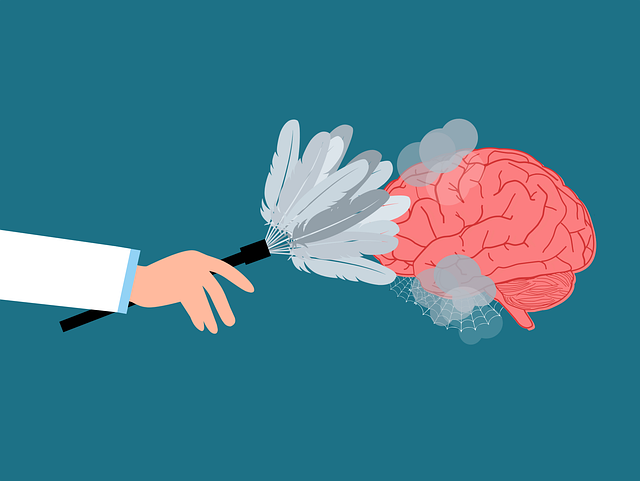Healthcare provider burnout, fueled by long hours, heavy patient loads, and emotional strain, poses significant risks to both professionals' well-being and patient care. To combat this crisis, strategies such as therapy for adults dealing with domestic violence, confidence-boosting initiatives, and public awareness campaigns are crucial. Creating supportive work environments that prioritize mental health fosters resilience, reduces burnout rates, and improves patient care. Evidence-based interventions like cognitive-behavioral therapy (CBT) and self-care practices like setting boundaries, sufficient sleep, and exercise enhance well-being. Organizations can integrate therapy for adults who have experienced domestic violence and mental wellness podcast series to reach a broader audience and foster a more sustainable medical community.
Healthcare provider burnout is a growing concern, impacting not just individuals but the overall quality of patient care. This comprehensive guide explores effective prevention strategies targeting this pervasive issue. We delve into the causes and effects of burnout among healthcare workers, providing insights from various perspectives. From employer initiatives to evidence-based interventions in clinical settings, we offer practical solutions. Additionally, we emphasize self-care practices for front-line workers and highlight the integral role of mental health services. By implementing these strategies, healthcare organizations can foster a healthier, more resilient workforce.
- Understanding Burnout Among Healthcare Providers: Causes and Effects
- Creating a Supportive Work Environment: Strategies for Employers
- Evidence-Based Interventions for Burnout Reduction in Clinical Practice
- Incorporating Self-Care Practices into Daily Routines for Front-Line Workers
- The Role of Mental Health Services in Preventing and Addressing Burnout
Understanding Burnout Among Healthcare Providers: Causes and Effects

Healthcare provider burnout is a growing concern within the medical community. It stems from the intense demands and high-pressure environments that healthcare professionals often face. Several factors contribute to this phenomenon, including long working hours, heavy patient loads, emotional strain from dealing with challenging cases or trauma, and a lack of work-life balance. These conditions can lead to chronic stress, exhaustion, and a sense of detachment from one’s work.
The consequences of burnout among healthcare providers are significant. It not only impacts their well-being but also affects patient care. Burnout can result in decreased productivity, reduced clinical decision-making skills, increased errors, and even patient dissatisfaction. Moreover, it may drive professionals to leave the medical field, creating a shortage of skilled healthcare workers. Recognizing these issues is vital, and strategies such as therapy for adults dealing with domestic violence, confidence-boosting initiatives, and public awareness campaigns can play a significant role in preventing and addressing burnout. Promoting positive thinking and work environments that support healthcare providers’ mental health are essential steps towards a more sustainable and resilient medical community.
Creating a Supportive Work Environment: Strategies for Employers

Creating a supportive work environment is a key strategy for employers to prevent healthcare provider burnout. This involves fostering an atmosphere that prioritizes emotional well-being promotion techniques and conflict resolution skills. Employers can organize regular workshops on stress management, mindfulness practices, and positive thinking to help staff navigate demanding situations. Additionally, providing access to therapy for adults who have experienced domestic violence or other traumatic events can significantly contribute to their overall resilience and job satisfaction.
By implementing these initiatives, healthcare organizations can create a more nurturing setting where professionals feel valued and equipped to handle challenges. Such an environment not only reduces burnout rates but also enhances the quality of care provided to patients. Encouraging open communication, promoting healthy work-life balance, and recognizing individual efforts are integral components of this supportive framework, ultimately leading to a happier and more productive workforce.
Evidence-Based Interventions for Burnout Reduction in Clinical Practice

In the fight against healthcare provider burnout, evidence-based interventions have proven to be powerful tools for reduction and prevention. These strategies, grounded in scientific research, offer a roadmap for clinical practice that prioritizes well-being and resilience among medical professionals. One such approach is integrating mood management techniques into daily routines. This involves teaching practitioners coping mechanisms for stress, anxiety, and depression, fostering an environment where they can tend to their own mental health alongside patient care.
Additionally, building inner strength through therapeutic practices has shown significant benefits. Techniques like cognitive-behavioral therapy (CBT) empower healthcare providers to challenge negative thought patterns and develop healthier perspectives. By focusing on self-care and personal growth, these interventions not only alleviate burnout but also enhance the quality of patient interactions. For instance, in the context of therapy for adults experiencing domestic violence, nurturing resilience can help professionals navigate challenging scenarios with empathy and effectiveness, ultimately preventing burnout in high-stress environments.
Incorporating Self-Care Practices into Daily Routines for Front-Line Workers

Front-line healthcare workers often find themselves at high risk of burnout due to the demanding and emotionally taxing nature of their work. Incorporating self-care practices into daily routines is a crucial strategy for prevention. This includes setting boundaries, ensuring adequate sleep, engaging in regular physical activity, and prioritizing mental health. Therapy for Adults who have experienced domestic violence can be particularly beneficial, providing a safe space to process trauma and develop coping mechanisms that foster resilience.
Cultural sensitivity in mental healthcare practice plays a significant role in burnout prevention. Healthcare providers must be mindful of the diverse needs and experiences of their patients, incorporating cultural considerations into treatment plans and self-care recommendations. Mental health education programs designed with an emphasis on burnout prevention can equip professionals with tools to manage stress, enhance well-being, and build resilience against workplace challenges.
The Role of Mental Health Services in Preventing and Addressing Burnout

Burnout among healthcare providers is a growing concern, and addressing mental health is a critical component in prevention strategies. Access to quality mental health services plays a pivotal role in supporting professionals facing high-stress work environments. These services can offer much-needed therapy for adults who have experienced trauma or domestic violence, which are prevalent issues within the healthcare community. By integrating such support, organizations can foster a culture of resilience and well-being.
In addition to individual therapy sessions, implementing mental wellness podcast series can be an innovative approach to reach a broader audience. These podcasts can provide valuable insights on topics like depression prevention and self-care routine development, offering practical strategies for better mental health management. Tailoring these resources to the unique challenges faced by healthcare providers can significantly contribute to long-term burnout prevention.
Healthcare provider burnout is a pressing issue, impacting not only individual well-being but also patient care. By implementing evidence-based strategies, such as creating supportive work environments, incorporating self-care practices, and providing access to mental health services, organizations can foster a culture of resilience. Additionally, recognizing the unique challenges faced by front-line workers, like those in therapy for adults affected by domestic violence, is crucial for developing tailored interventions. Through collaborative efforts, we can prevent burnout, enhance job satisfaction, and ultimately improve healthcare outcomes.









